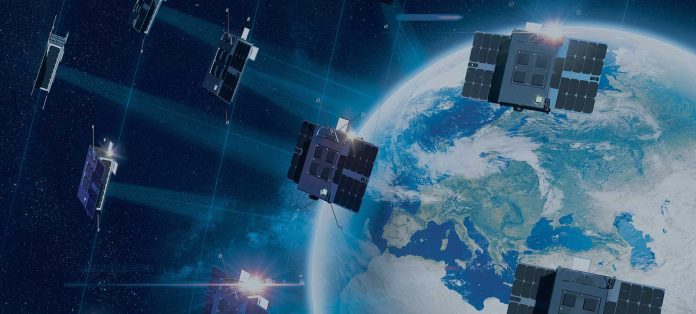UK-based (Sweden-owned) IoT connectivity specialist Wyld Networks and US-based IoT solution provider TrakAssure have announced the first fruit of their joint labour, also with LoRaWAN system provider Senet and satellite operator Eutelsat, to deliver a “first-to-market” terrestrial-and-satellite IoT solution for the supply chain industry. The pair said Wyld’s hybrid IoT connectivity will be integrated into TrakAssure’s IoT trackers.
Wyld and TrakAssure formed the new Multimodal IoT Infrastructure Consortium (MMIIC) at the start of the year, together with Senet and Eutelsat. The group’s remit, they said, is to run technical tests and pilots and also beat the rest of the market to deliver a “first” low-power wide-area (LPWA) solution for the supply chain industry that combines both terrestrial and satellite LoRaWAN connectivity.
Initial test work has started to check LoRaWAN sensors switch between terrestrial LoRaWAN networks and low-earth orbit (LEO) nanosatellites, managed by Senet and Eutelsat, respectively. Wyld Networks and TrakAssure are engaged to jointly develop new supply-chain IoT devices, with the former in charge of the hybrid LPWA connectivity design and the latter in charge of IoT sensor gadgetry. The newly announced TrakAssure products will go on any terrestrial LoRaWAN network.
The arrangement will see its tracker solutions fitted with hybrid IoT modules from Wyld, also incorporating Bluetooth and Wi-Fi mesh radio capabilities, alongside support for LoRaWAN-based terrestrial LPWA and Eutelsat-based LEO satellite (ultra) LPWA traffic. TrakAssure’s supply chain solutions include IoT sensors, in various combinations, for temperature monitoring, geofence alerts, delivery proofs, and other visibility requirements.
It claims to offer “specialised IoT sensors with a scalable and secure customised private and public platform infrastructure, to offer enterprise level visibility across the entire, fragmented supply chain, providing an improved customer experience, operational efficiency and significant cost savings”. Wyld’s hybrid IoT modules provide connectivity “anywhere in the world”, by virtue of the satellite hook-up.
“Traditional wireless networks only cover 15 percent of the world’s surface,” the pair said in a statement. Hybrid terrestrial/satellite networks fill the gaps for fixed and mobile assets in terrestrial black-spots and not-spots; their value is notable in remote industrial venues and the maritime/shipping industry, and vehicles travelling between. Gartner forecasts $33 billion will go on IoT tracking in the logistics industry in 2025 globally, from $10 billion in 2020.
A joint statement from Wyld and TrakAssure said: “The process of bringing products from raw materials to retail shelves with as little waste and as much efficiency as possible is a massive challenge for those involved in the global supply chain. However, chip shortages and lean manufacturing practices have pushed supply chains to their limits, making them vulnerable to even the smallest of disruptions.”
US chipmaker Semtech, which owns and licences the LoRa technology, released a software upgrade for LoRa integrated circuits and gateways in January to enable direct transmissions to satellites. The upgrade, available for second generation LoRa chips, enables the new long-range frequency-hopping spread spectrum (LR-FHSS) data rate on LoRaWAN networks, ratified by the LoRa Alliance in November to enable earth-to-satellite IoT comms.
The MMIIC group said in January it expects to launch commercial services in the second half of 2022, with pilots starting this month (February); it is unclear whether the new TrakAssure products bring the commercial launch forward, or are in fact a part of the initial pilot schedule. A statement in January said: “The companies are targeting the global supply chain, including container logistics and related asset tracking, as the first and anchor applications.”
Don Miller, board member at TrakAssure, commented: “We are entering a new space race for low-bandwidth, satellite IoT connectivity and two of the most disruptive applications are global asset tracking and supply chain monitoring. The combined strengths of Wyld and TrakAssure will allow for augmentation of existing cellular and other WLAN based solutions, and open markets for dual-mode terrestrial and satellite technologies that are more price sensitive with constrained infrastructure, and all compatible with the same LoRaWAN terrestrial network that is growing at an exponential rate.”
Alastair Williamson, chief executive at Wyld Networks, said: “We are excited that TrakAssure has chosen to integrate our Wyld Connect satellite IoT solution into its sensors to provide 100 percent global connectivity. This partnership is an extension of the MMIIC Consortium agreement announced earlier this year and we look forward to offering our joint solution to many stakeholders in the global supply chain.”

